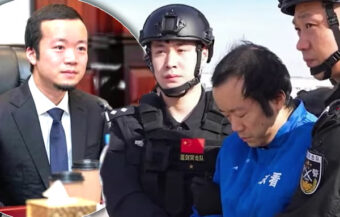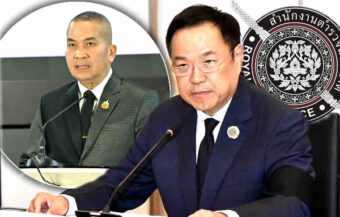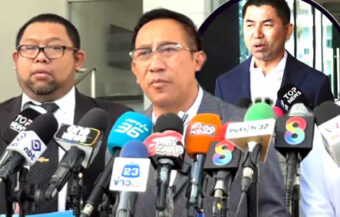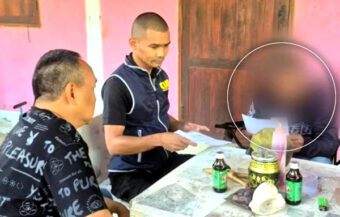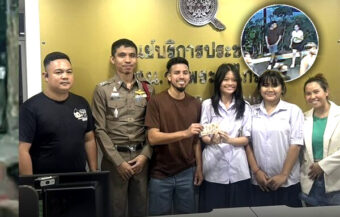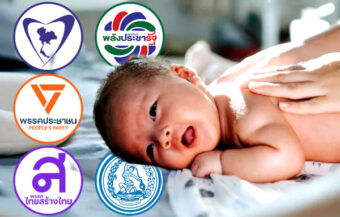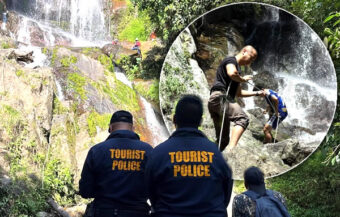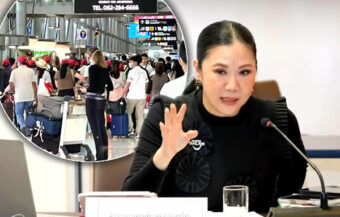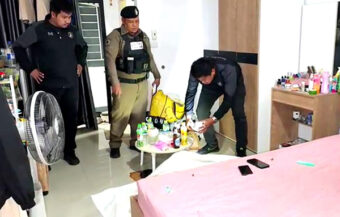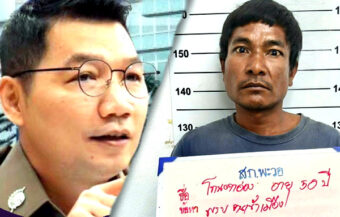US academic Paul Chambers, jailed overnight in Thailand on lèse-majesté charges, is now safe in Italy with family before returning to the US. Despite no conviction, he calls the ordeal traumatic and urges reform of Thailand’s harsh speech laws.
American professor Paul Chambers has landed in Italy and is presently spending time with his family there before returning home to the United States. Speaking to U.S. TV on Monday, he recalled the trauma he suffered in April when he was imprisoned on lèse-majesté and Computer Crime Act charges in Phitsanulok Prison for one night. Last week, the Attorney General ordered the case against him to be abandoned on the basis that there was no evidence whatsoever of wrongdoing. Nonetheless, Dr. Chambers explained on Monday that he was only given his passport back through U.S. Embassy officials at Suvarnabhumi Airport.
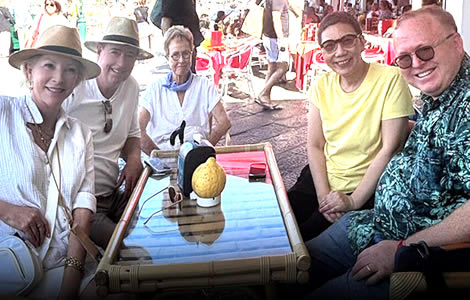
This came after the academic had his visa revoked and lost his job at Naresuan University. He had lived and worked in Thailand for 32 years. Notably, before departing Thailand, the academic declared that he never breached the country’s lèse-majesté law. At the same time, he insisted he had the highest respect and reverence for Thailand’s Royal family.
American academic Paul Chambers has reunited with his family in Italy after a harrowing legal ordeal in Thailand. Chambers, a longtime political science professor and Thai military expert left the country last week after prosecutors formally dropped criminal charges against him.
The case attracted growing attention in both Thailand and the United States. Chambers was arrested on April 8 in Phitsanulok province. Notably, this came after only finding out about the charges from his employer four days earlier.
Chambers describes traumatic arrest and release before the case was dropped after a prolonged legal dispute
He was charged under Article 112 of Thailand’s Criminal Code, also known as the lèse majesté law. Additionally, he faced charges under the Computer Crime Act.
He spent one night in prison before being released on bail. Nevertheless, Chambers later described the experience as deeply traumatic. “I wasn’t found guilty, I was put in prison on that accusation which I continue to deny,” he said. “Taken to prison where I suffered some indignities.”
Afterwards, he was forced to wear an ankle bracelet as well as pay a surety of ฿300,000.
Chambers was not convicted of any crime. However, his case was not immediately dismissed. It remained active until the end of May when Thailand’s Office of the Attorney-General (OAG) in Bangkok formally ruled not to prosecute.
That decision came after a dispute between local prosecutors and police. Initially, the Phitsanulok prosecutor dropped the charges. Yet, police in Phitsanulok objected and insisted on further review. The OAG then intervened. After reviewing all available evidence, it concluded there was no case against Chambers.
Seminar listing sparked lèse majesté case despite no direct link or credible evidence against Chambers
The case had stemmed from an academic announcement. A seminar hosted by the ISEAS–Yusof Ishak Institute in Singapore was promoted online. Local officials argued that this content violated Article 112 and computer crime laws. However, no concrete evidence ever emerged linking Chambers to illegal conduct.
Following his release from prison in April, Chambers remained in Thailand under legal uncertainty. His passport had been withheld during a visa revocation and review process. In turn, this caused him to lose his job at Naresuan University. He was informed of this on April 9th, 2025, the day after he was charged and imprisoned. According to Chambers, he only received it back at Bangkok’s Suvarnabhumi Airport with help from the U.S. Embassy.
He subsequently flew to Singapore for a brief layover. From there, he travelled on to Italy, where he was reunited his American family.
His wife, Associate Professor Napisa Waiturakiet, also left Thailand with him. Napisa served previously as Dean of the Faculty of Social Sciences at Naresuan University. This is where Chambers also worked.
In Italy, Chambers was met by his mother, brother, and sister. It was their first time seeing each other in months. “It took months for the brothers to finally be able to embrace each other,” reported FOX 4 Dallas-Fort Worth.
Chambers says imprisonment without guilt remains a lasting trauma despite eventual return to freedom
Speaking with FOX 4, Chambers said returning to his family was deeply emotional. “This is a dream come true,” he said.
He again maintained his innocence. “I was not found guilty, but I was imprisoned on the charges, which I still deny,” he stated. “I was imprisoned in a degrading prison.”
Although he was jailed for only one night, Chambers said the ordeal lasted much longer. “This travesty of justice extended all the way up to when I was getting on a plane to leave Thailand.”
From the outset, Chambers’ family fought to clear his name. His wife and American relatives contacted their state representatives in Oklahoma. They also appealed to the White House and lobbied the U.S. Embassy in Bangkok.
“President Trump will be very happy not to receive any more letters from me,” joked his mother, Peggy Chambers.
Their efforts helped bring diplomatic attention to the case. By late April, U.S. trade negotiators had reportedly raised the matter with Thai authorities. Soon after, local prosecutors dropped the case. However, only after the OAG ruling in Bangkok was Chambers truly free to leave.
Wife of Chambers says case inflicted widespread harm and urges accountability for those responsible
In Italy, Napisa spoke out about the toll the case had taken. She said the ordeal had damaged not only Chambers, but also their family, friends, and colleagues. “This should not have happened in the first place,” she said. “We want to see whoever did this, whether it was the security forces or anyone else, held accountable.”
Chambers believes the use of several draconian legal provisions is increasingly political. In addition, he fears the situation is also open to abuse. Certainly, this includes Article 112 on royal defamation and the 2007 Computer Crime Act.
Although he is now safe, Chambers said others are still vulnerable. For that reason, he hopes to advocate for reform. His plans include continuing academic work and speaking out about Thailand’s legal system.
Still, he has not given up on the country. Chambers first arrived in Thailand in 1993. Over three decades, he became one of the kingdom’s best-known foreign academics. His expertise on Thai politics, the military and civil society gained wide recognition.
Now, however, he must remain abroad. Chambers said he plans to return to the United States with Napisa. Before that, they will spend time with family in Italy.
Family and supporters say international pressure was key to freeing Chambers and ending the case in Thailand
His sister Rhonda called the outcome a victory for teamwork. From activist groups in Thailand to U.S. officials, many had worked behind the scenes to help. “It was a great effort from everyone,” she said.
Photos released on Monday showed Chambers smiling with his family in Italy. His relief was clear, but so was his determination to keep speaking out.
Chambers emphasized that he had never insulted Thailand’s monarchy. The charges, he argued, were unfounded from the beginning. Indeed, before he left the country he reaffirmed his respect for the Royal Family and the monarchy.
Although the case is over, its implications remain—particularly given the exposure this story and others are presently receiving across the world.
Thailand’s lèse majesté, Computer Crime and wider defamation laws face scrutiny as critics warn of abuse
Thailand’s lèse majesté law continues to face international scrutiny. Article 112 carries heavy penalties for perceived slights against the monarchy. In recent years, critics and some politicians have circumspectly called for reform of the provision and other laws. Meanwhile, conservative voices see it as a critical tool in upholding the integrity of the state.
In addition, there is also heightened concern over the country’s wider defamation provisions and the Computer Crime Act. The latter can see prosecutions for publishing materials deemed inaccurate or not true. Meanwhile, wrongdoers often use criminal and civil defamation laws to punish those who speak out against them.
On Monday, Dr. Chambers warned that such laws stifle free speech and can be abused to silence dissent.
At the same time, due to recent constitutional court decisions, it is now questionable whether the lèse majesté law can even be criticised. Certainly, the Move Forward Party, which won the 2023 election, was dissolved for attempting to amend the provision in parliament and indeed campaigning to do so.
Foreign academics are not immune as Chambers case shows how fragile speech protections have become
Chambers’ case highlighted how even foreign academics may face consequences. Although he had worked for years within Thailand’s academic institutions, a seminar listing on a foreign website triggered his arrest. It was neither written nor approved by the academic in Thailand.
Supporters say the case never should have happened. “This proves to the world that Paul has suffered,” said Napisa. “Including his family, friends and loved ones.”
Paul Chambers case officially over following Attorney General’s review. Academic has left Thailand
Thaksin confirms that the Paul Chambers case is now being raised by US trade negotiators with Thailand
US academic Paul Chambers is fighting Nareauan’s University decision to dismiss him on April 9th
Phitsanulok Attorney General decides to drop charges against US academic Paul Chambers in case review
Now, as he begins a new chapter abroad, Chambers said he wants his experience to mean something. He hopes his case will serve as a warning—and a call to reform Thailand’s legal provisions, which are often abused to silence adversaries. In short, used towards political ends.
For now, he is focused on healing and spending time with his family. But the pain of what happened will not fade quickly.
Join the Thai News forum, follow Thai Examiner on Facebook here
Receive all our stories as they come out on Telegram here
Follow Thai Examiner here
Further reading:
Paul Chambers case officially over following Attorney General’s review. Academic has left Thailand
US academic Paul Chambers is fighting Nareauan’s University decision to dismiss him on April 9th
Third Army defends its role in the prosecution of American Professor Paul Chambers in Phitsanulok
Thaksin confirms that the Paul Chambers case now being raised by US trade negotiators with Thailand





